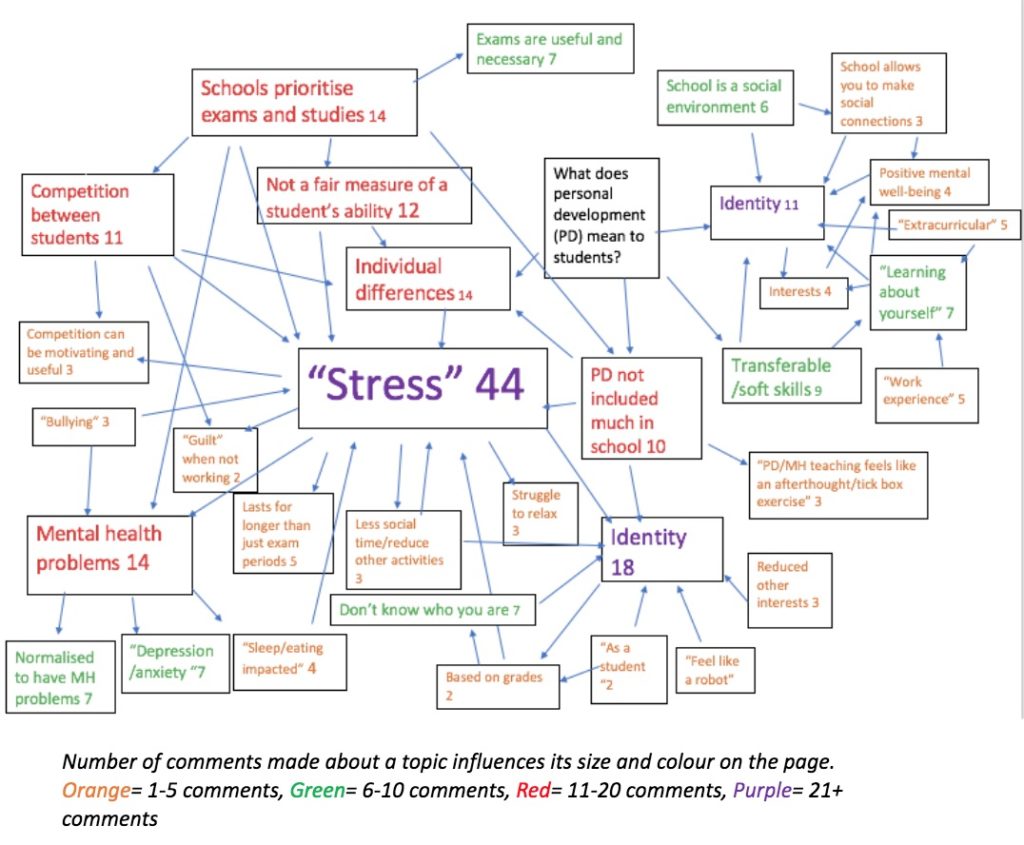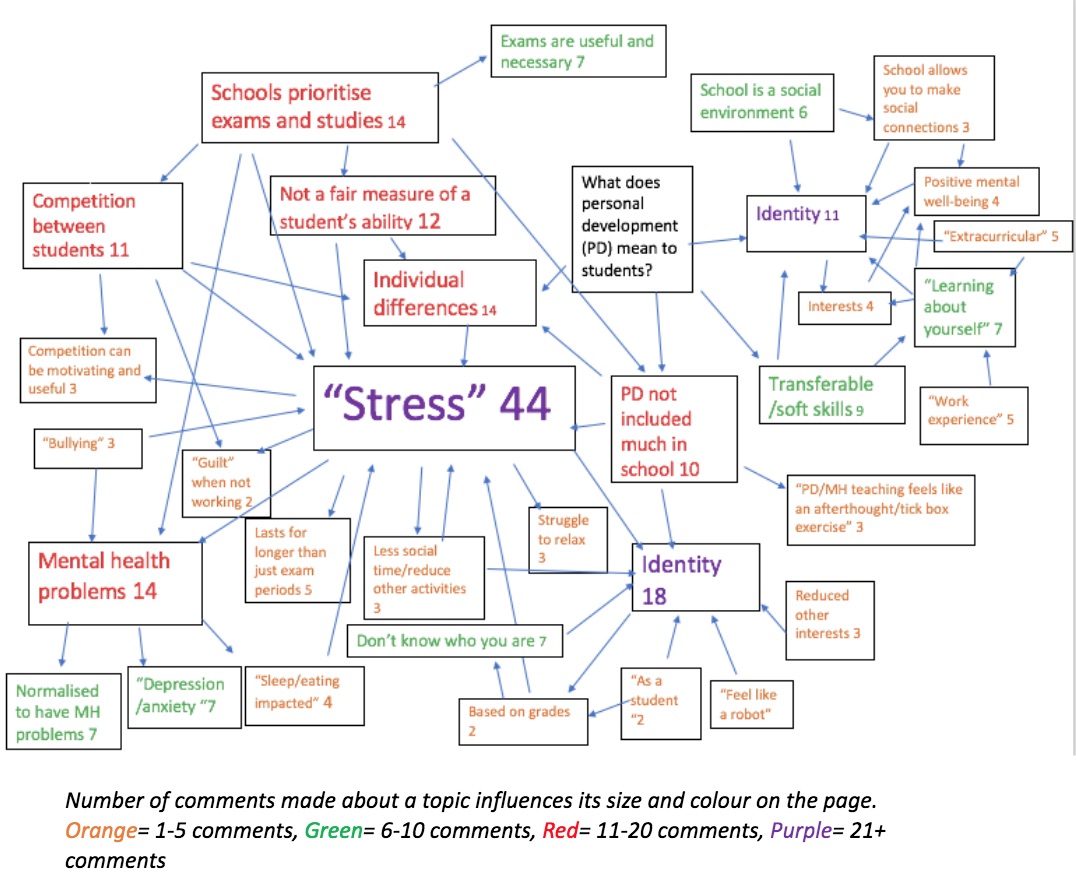Schools are prioritising academic achievement over wellbeing and growth, by States of Mind

With our youth-led research project, Breaking The Silence, we’re exploring the impact of the UK’s educational system on young people’s mental health and wellbeing. Today we hear from Jaspar Khawaja, a doctoral student at the UCL Institute of Education, who has been collaborating with us in recent months to develop the research.
In our previous study, student researchers produced a two-part questionnaire which was answered by 247 young people in a London college. The student respondents asserted that the education system directly contributes to the deterioration of the mental health of many young people.
To expand on these findings, our student researchers wanted to investigate in more depth through focus groups, thus providing a forum in which students could offer thoughts on the pressing issues in the education system and how things might be improved.
What struck me most, during the focus groups with young people was how clearly they could explain problems relating to their educational and mental health experiences, and their capacity to suggest improvements.
What Did We Do?
Once again, we used a Participatory Action Research (PAR) approach in which student researchers, alongside State of Mind practitioners, devised the methodology and analysed the data. I conducted four online focus groups after student researchers identified relevant questions. Eleven young people from four different London schools volunteered to take part in the research, responding to adverts sent out by their colleges. Our research questions were:
– What impact do school examinations have on young people throughout their time in education?
– What impact does the education system have on young people’s mental wellbeing?
– What does personal development mean to you during adolescence?
– How do young people think their educational experiences could be improved?
What Did We Find?
This thematic map highlights the topics that were discussed during the focus groups.

We conducted a thematic analysis to analyse the core themes discussed in the focus groups. The student researchers supported the analysis and decided which quotes should be used to communicate the themes. Some of the key findings are below.
Theme 1: Individual differences are not currently accounted for in educational practices.
The exam system was said to be “biased to certain students” and “doesn’t really cater to like different types of people”. Additionally, young people acknowledged that amongst their peers, some “can deal with stress better” but the education system can be “too much” for many young people.
Theme 2: Concerns about mental health and wellbeing
The students pointed out that “panic attacks”, “feeling depressed” and “eating disorders” were common experiences.
“Whether or not [mental health problems] are directly caused by school… it’s made worse by the education system,” commented a student.
They asserted that the way mental health is discussed in schools is “outdated” and “cringy”, and a lack of support and understanding means that young people are often “acting as counsellors” for one another. Young people talked about feeling emotionally vulnerable and raised concerns that mental health problems are “normalised” amongst their peer group. They felt that this should not be the case for teenagers.
Theme 3: Impact of the education system on the formation of student identity
Students reflected that personal development was closely tied to an individual’s identity, describing it as “being able to understand yourself and understanding how you cope with stress.” However, participants described “an identity crisis” amongst young people where they “think this is who I am now, I’m a student”. They talked about how they “put so much energy and so much stress and time into school”, meaning they don’t have the time to figure out who they are outside of education. Extracurricular activities were frequently discussed as being “identity forming” and as allowing students to discover their interests. But it was consistently suggested that little time exists to pursue these. This raises questions of how personal development can be brought into the curriculum.
Theme 4: Schools prioritise academic achievement over mental health and wellbeing
The students expressed that the underlying message always seems to be, you still need to prioritise your studies above all else. They felt that the school system does not “value your mental health as much as they value your academic success”. The competitive nature of the education system was generally said to have a negative impacts as:
“You always end up feeling like you’re not doing enough in comparison to other people”… “If you’re not doing as well as everyone else, then you’re going to be a failure.”
Theme 5: The importance of relationships
The young people discussed how the education system should provide them with the opportunity “to be introduced to different types of people” and learn from others. They also described the impact of “amazing teachers” who push them to be better, not just academically but “as a person.” Although this can be really positive, the students felt there needs to be increased “emphasis on a mutual connection or mutual trust between teachers and students”, and:
“Teachers should be trained a little bit more on how to build a connection with their students”… “giving guidance on not just lessons but life as well”.
Theme 6: Suggested changes to the education system
Participants offered a range of improvements to the exam system, such as having “different ways of assessing like your competence and skills” involving “personal input” to develop curiosity rather than “working and learning for someone else.” They felt the removal of coursework has negatively impacted their emotional wellbeing and potential attainment. Young people strongly asserted that they need to have more space to relax and socialise because “if your mind’s preoccupied with studying… you just don’t think it’s very important to really figure out your own identity”.
The young people questioned assumptions about the purpose of education system that many have come to accept:
“School doesn’t only have to be for learning… it doesn’t only have to be a space for academic achievement. I feel like it can be so many other things. Because I feel like part of developing and growing up is a lot more than just your grades”.
What Does This Mean?
In this study young people questioned the overwhelming focus of the education system on academic achievement as a sole priority, at a cost to their wellbeing and growth as individuals. They indicated that the exam system results in unhealthy competition, student disempowerment, a lack of focus on the development of relationships and little recognition of individual diversity. In addition, they felt that skills and qualities that aren’t easily quantified are not valued in the education system, to the detriment of their personal development.
The research shows that young people are able to offer eloquent critique of the education system based on their experiences and have a range of thoughts on improvements. Their views must be placed at the centre of all decisions made in regards to the purpose of their education provision.
States of Mind are continuing to develop the Breaking The Silence project in collaboration with UCL Institute of Education. The next stage will see them work with a group of students to reimagine educational assessment. Stay tuned.

